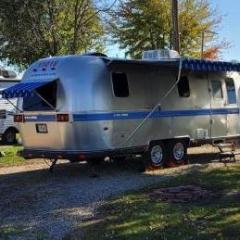-
Content Count
1997 -
Joined
-
Last visited
Content Type
Profiles
Forums
Blogs
Gallery
Everything posted by richard5933
-
The modern 'equivalent' would be 315/80R22.5 tires. They are about the same outside diameter, but they are a touch wider. Some use a 295/R2.5 as a replacement - all depends on the specs of each tire. The 12R22.5 is still in use, although it's not that common anymore. It is one of those tire sizes where carrying a spare (even if unmounted) would be an advantage if you travel in out-of-the-way places were a replacement tire might be hard to find.
-
I love that front privacy curtain. Homemade?
-
Yeah - that was my thought, that the new water heater would require a new switch setup. Glad you found what you need. Post a few photos when you have a minute so that others doing the same upgrade will know what to expect.
-
Welcome to the forum Ron. Are you wiring this to same remote switch as you had on the old water heater or a new one that came with the new water heater?
-
Please let us know how you like those tires - they are on top of my list for when I replace my tires later this year.
-
You can rate a topic (see top of thread) but I don't think you can 'like' a comment.
-

2006 Newmar Essex No tank level readings on Monitor
richard5933 replied to tjsolberg's topic in Water and Holding Tanks
If the tank monitors use sensors inside the tank, the first step would be to confirm that they are clean. Fresh water sensors could have lots of mineral buildup if hard water was used in the tank, and the gray/black tank sensors would have the usual buildup of crud. -
Interesting concept. I've read about some owners doing the same thing by incorporating a large battery bank/inverter into their generator system. I imagine that this allows for the use of a smaller generator than would be required if running just on generator, as the inverter can help fill the short-term heavier loads imposed by things like starting a/c units, etc. All that's really required to set this up is a control system that automatically can shift the source to meet the load. Nice that they've incorporated it all into one package. Have you seen this installed and in use yet?
-
Gorgeous woodwork inside that coach. But, you've got a ways to go to consider that an 'oldie' - compared to mine it's barely broken in. Welcome and happy trails!
-
If it is the board, isn't there a company making an 'improved' version of the control board for these older fridges?
-
Maybe using something like this? https://marine.steelerubber.com/drip-rail-70-3851-360 It's white and would possibly blend in with the roof.
-
I just looked up the Arizona vehicle registration site - it looks like instead of paying the sales tax you get to pay a vehicle tax every year as part of the fee to register your vehicle. Different than how we do it here, where we pay sales tax at time of purchase and only pay a small registration fee every year for our tags. Every state does it differently, but in the end they all get their money.
-
Don't they collect the tax when you go to register the used vehicle at the DMV? That's why when I've bought vehicles from out of state I don't register it there, just get a temporary tag for the trip home. When I bought my current coach it was in NJ. I had the seller overnight the title to me, and I was able to register it in Wisconsin before leaving home. They calculated tax based on the sales price (one-time tax). I flew to NJ with the plates for the coach and never even had to talk to the NJ DMV.
-
Just be careful that whatever you do is done in a way that when it fails, and it will eventually, it doesn't take the a/c units with it or allow the condensate to back up inside the coach. This will depend on your particular remedy, but I'm thinking that there should be some way for a failed condensate pump to overflow in a safe way before it backs up into the a/c unit or into the coach.
-
That's a complicated question. Many of the people who are licensing their rigs in Montana do so by creating an LLC in Montana, and then they register the rig in the name of the LLC and not to them personally. There are other ways of accomplishing this, but as more and more states share databases with each other there are more crackdowns on people doing this. I know I'm going to sound like my mother here, but even if there are legal ways to get around paying the taxes in your home state it doesn't make it right. For every person that skirts the rules (by legal means or otherwise) those left doing it the traditional way are carrying a larger share of the tax burden than they should be. My thought is that there is no free lunch. In Wisconsin we don't have personal property taxes on vehicles, so my annual registration is around $120. It would be the same regardless of the value of the rig. It may be cheaper to do the annual registration here, but of course the state makes up for it with higher taxes and fees in other areas. The bills have to get paid, one way or the other.
-
It doesn't matter what they book calls it - what matters is that the voltage levels for the various charging cycles are correct for your batteries. When we installed the Victron MPPT charge controller we had to compare the various options against the chart provided by Trojan for our batteries. None of the standard settings was exactly what Trojan called for, but they had one close. One phone call to Trojan confirmed that it was within acceptable for us. You might also be able to set custom levels, depending on your controller. We discovered that by using the Bluetooth interface on ours we could do that.
-

Need in dash A/C repair jacksonville, FL area
richard5933 replied to miturn1's topic in Systems and Appliances
Looks like you have a number of Freightliner dealers in your area. That's where I'd start searching, unless someone else has a specific shop to recommend. In my experience it's sometimes best to go to the shop and talk to the service department ahead of time in person rather than by phone when bringing a coach to a commercial shop for the first time. -

Need in dash A/C repair jacksonville, FL area
richard5933 replied to miturn1's topic in Systems and Appliances
Here in Milwaukee the International dealers/repair shops have a/c techs that work on various make/model of vehicles, including motorhomes. You're not limited to an RV dealer - call around to the various places that work on trucks/buses and see who has an a/c tech. An added plus is if you can find a dealer from your chassis manufacturer. -
Rims/wheels are the same all around for me.
-
Here's what I get from this thread... Engine was starting fine for months. Then it didn't. Starter was replaced, and after that it started once. Now it makes a rapid clicking sound instead of starting. This leaves me wondering what caused the starter to fail in the first place. Maybe it wasn't the starter, but something related to it. A sitting vehicle is prone to corrosion in the strangest of places, as well as mice damage. Battery cables were replaced, according to the initial post. What about the cable bringing power to the starter? What about the grounding strap between the engine and the chassis? Either of those could cause this problem, as they'd prevent the starter from getting proper voltage. They can look good on the outside but be nothing but rot inside the cable jacket. Have you gone through the engine compartment and underneath to inspect the wiring harness for signs of rodent damage? One piece of insulation chewed through could cause a short when you turn the key, causing all kinds of problems.
-
That's not happening today, unless you're volunteering to fabricate the hitch for us. Due to the unibody construction of our coach, the hitch needs to be mounted to the bulkhead supports on the forward end of the engine bay, and it has to be made to be removable so the lower end of the engine can still be accessed for maintenance. Apparently putting a hitch on ours will not be a simple install. We thought about it, and then decided it wasn't worth the hassles trying to find a shop that can fabricate the hitch and that can safely lift the coach to do so. So far it hasn't hampered our travels any. We either take the electric bikes or rent a car for the day. That might be what we do here. We'll be about two hours away where we are camping for the wedding, and we've rented in that area before. In the end, for the few times we need to rent a car or take Uber, it ends up being much less expensive than the cost of a toad - once you add up the purchase, maintenance, insurance, etc. a toad cost we have lots to play with for rental. and Uber.
-
You might be right. I was thinking that parking might be possible at the museum, since their lot looks pretty big. I'll have to call them to find out if the roads leading to them are weight restricted. We carry electric bikes and are good for about a 25 mile range, so once we get close and park we're good to go if the weather is nice. I was really hoping to find out if the stop is even worth the effort though, since sometimes these little stops are great and sometimes not so much.
-
Here's a longer description of what others have already mentioned - there is need for some cleaning in there. https://thenorcoldguy.com/blog/norcold-refrigerator-not-staying-lit-on-gas-mode-propane-lp-all-models/
-
That's a great point - I've done the same. No point in carrying a spare if you don't maintain it.
-
All ours are the same right now. When we change the fronts out to the proper size later this year, we'll change the spare to match. If a rear blows out I figure I can at least get off the road to somewhere safe. If a front goes out, you're stuck.

